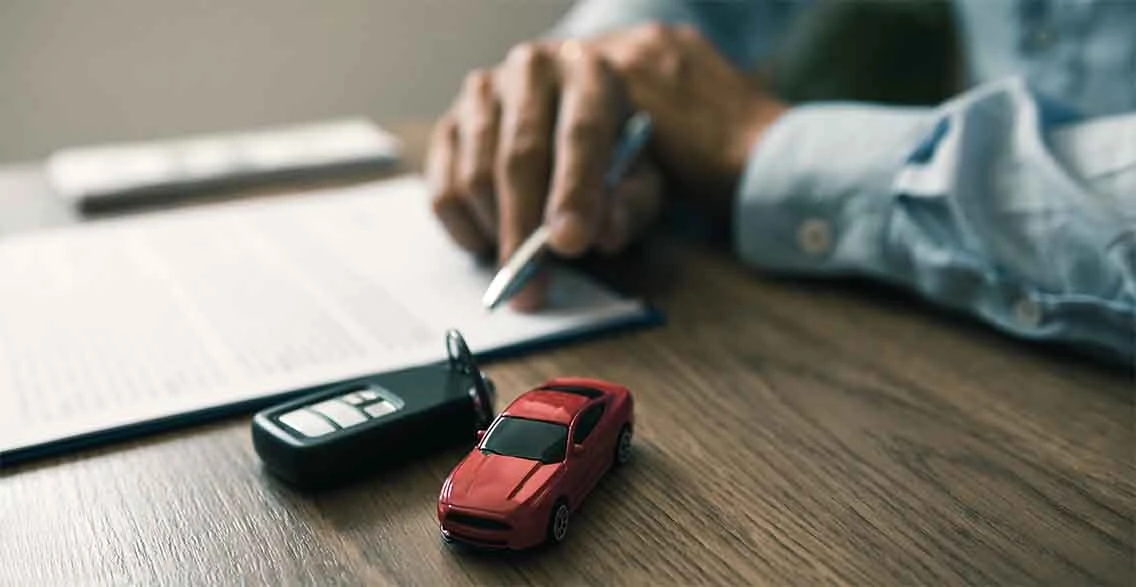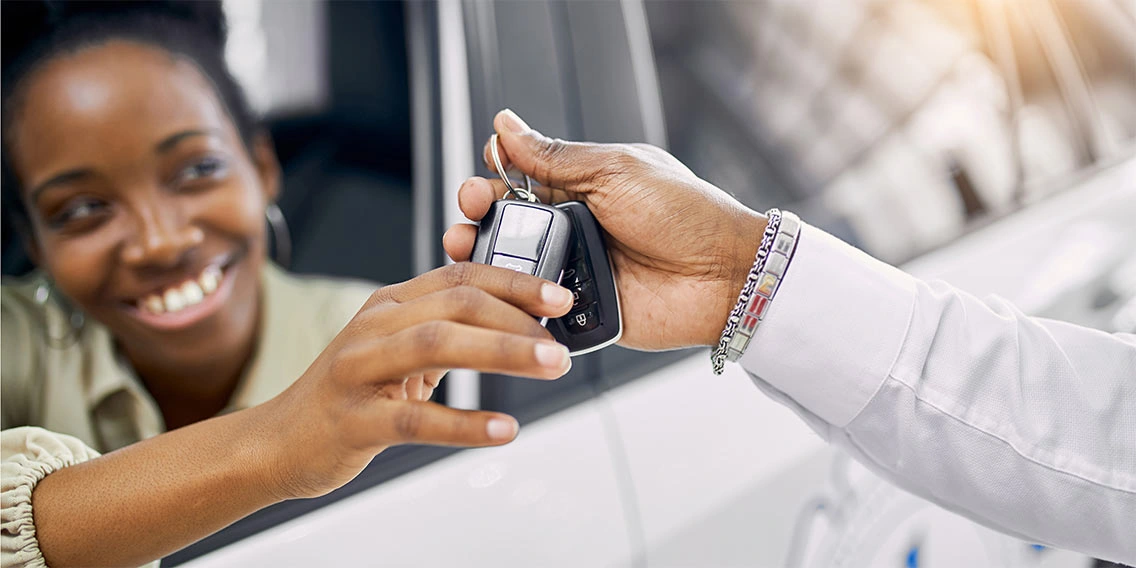AUTO
Personal Loan vs. Auto Loan: Which Is Better for Car Financing?
What you'll learn: Determine whether a personal loan or auto loan is right for your car financing needs
EXPECTED READ TIME: 7 MINUTES
Buying a car is a big decision. It’s an expensive purchase, and if you decide to finance your new car, you could be paying on it for years.
That’s why it’s important to think about how you want to finance your new ride. Most buyers turn to auto loans, but there are other options — like using a personal loan — for buying a car.
How does buying a car with a personal loan vs. an auto loan work? Let’s find out.
Personal Loan vs. Auto Loan Comparison
The main difference between a personal loan and an auto loan is that a personal loan can be used for anything, whereas an auto loan is only used to purchase a car.
While personal loans give you more flexibility in choosing your car, they also cost more than traditional auto loans. It’s important to decide on a car-buying budget and choose a financing option that works with that budget.
Below are some other important distinctions you should consider when choosing between a personal loan and an auto loan.
| Personal Loan | Auto Loan |
|---|---|
| Can be secured or unsecured | Secured against your vehicle |
| Higher interest rate (around 9.65%) |
Lower interest rate (around 4.95%) |
| Fixed or variable interest rates (changes with the prime rate) |
Fixed interest rates (6.33% - 17.52% for new, 6.58% - 17.77% for used) |
| Approval is harder (credit score of 690 or better) |
Approval is easier (lower credit scores accepted with bigger down payment or higher interest charges) |
| Fixed term (typically 12-84 months) |
Fixed term (typically 24-72 months) |
| Doesn’t require a deposit | Requires a deposit (often around 20% percent of car’s price) |
| No buying restrictions on the car you can purchase | May have limits on what car you can purchase (usually less than 10 years old, fewer than 100,000 miles |
Secured vs. Unsecured Loans
A personal loan is usually unsecured, but it can be secured depending on your terms. This means you are not required to put up collateral to get the loan.
Auto loans use your car as your collateral. If you’re unable to pay your auto loan, your lender can seize your car as payment.
Interest Rate
Interest rates are usually higher on personal loans than auto loans. That’s because personal loans are unsecured and riskier for lenders. As of 2022, interest rates on personal loans were around 9.65%, almost twice as high as interest rates on auto loans (which were set at 4.95%).
Factors like your credit score and payment history will also influence your interest rate. And you can always try to negotiate your interest rate on auto loans. (Some lenders allow you to negotiate your interest rate on personal loans, too, but this varies by lender.)
Interest rates are usually higher on personal loans than auto loans
Fixed vs. Variable Interest Rates
Personal loans can have fixed or variable interest rates depending on your loan’s terms, but auto loans are fixed for the life of the loan.
As of 2022, personal loan rates range from:
| Credit Score | Average Loan Interest Rate |
|---|---|
| 781-850 (super prime credit) | 6.59% |
| 661-780 | 10.93% |
| 601-660 (near prime credit) | 15.56% |
| 500-600 | 15.91% |
| 300-499 (deep subprime credit) | 15.30% |
As of 2022, auto loan rates range from:
6.33% (excellent credit) to 17.52% (poor credit) for new cars
6.58% (excellent credit) to 17.77% (poor credit) for used cars
3.38% (excellent credit) to 9.39% (poor credit) for refinanced auto loans
Approval
The approval process for personal loans and auto loans is similar, but it’s more difficult to get approved for a personal loan. Many lenders prioritize borrowers with a credit score of 690 or better. Borrowers with lower credit scores may pay much more interest if they can get approved.
If you don’t have much credit or your credit score is low, you might have an easier time getting approved for an auto loan as opposed to a personal loan. You may be subject to higher interest payments or be required to make a larger down payment, though. (We also have some tips for getting an auto loan if you’re concerned about qualifying.)
Fixed Terms
Both personal and auto loans are installment loans with repayment terms expressed in months (for instance, 12 months or 36 months).
You’ll make bigger monthly payments but pay less interest overall when your loan’s term is short. Longer terms allow you to make smaller monthly payments, but the loan will take longer to pay off and you’ll pay more in total interest charges. (For reference, the average monthly payment on a new car is $554 and on a used car is $391.)
Most personal loans have repayment terms of 12-84 months, while auto loans typically have terms of 24-72 months.
Deposits
Personal loans don’t require you to make a deposit on your new car. Auto loans, however, do — usually around 20% of the car’s price. The amount of that deposit depends on multiple factors like your credit history and the car’s price and age.
Buying Restrictions
Personal loans usually do not restrict the kind of car you can purchase. However, auto lenders typically reject cars that are over 10 years old or have over 100,000 miles.
Pros and Cons: Personal Loan vs. Auto Loan
Personal loans are great in some cases, but they have their downsides, too. If you’re considering using a personal loan to buy a car, think about these things:
| Pros of Personal Loans | Cons of Personal Loans |
|---|---|
| No down payment | More expensive |
| Buy without restrictions | Harder approval process |
| Sell before your car is paid off | May include additional fees |
| Less risk of repossession |
No Down Payment
Personal loans are great if you don’t have money for a down payment or just don’t want to put anything down.
No Restrictions
Personal loans are flexible. If you use one to buy a car, your lender won’t impose restrictions on the kind of car you buy. This is great if you’re buying a vintage car to restore or just want something inexpensive.
Sell Your Car Before It’s Paid Off
With a personal loan, your car isn’t collateral for the loan. That means you can easily sell your car before you pay it off if you’re unhappy with it or it no longer meets your needs.
Less Risk of Repossession
If you fall behind on your payments, your lender could still seize your car, but they would have to take you to court first. It’s easier for lenders to seize a car purchased with an auto loan.
More Expensive
Interest rates are usually higher for personal loans, meaning you’ll usually spend more on your car overall.
Harder Approval Process
You’ll need a solid credit score to get approved for a personal loan. Many lenders require a score of 690 or better.
Pros and Cons of Auto Loans
Auto loans are designed with car buyers in mind and come with some great perks, but they also have their drawbacks. Here’s what you should consider:
| Pros of Auto Loans | Cons of Auto Loans |
|---|---|
| More affordable | Down payment usually required |
| Easier to get approved | Harder to sell your car before it’s paid off |
| Fewer fees | Risk of repossession |
| Lender may limit which cars you can buy |
More Affordable
Auto loans are usually more affordable. In addition to lower interest rates, they often have longer terms than personal loans. That means you’ll have smaller monthly payments and pay less in interest, too.
Easier Approval
Although the approval process is similar for personal loans and auto loans, it’s easier to get approved for an auto loan even if you’re repairing your credit or don’t have credit.
Down Payment Required
Most lenders require you to pay a down payment for your car when you use an auto loan. However, sometimes you can skip the down payment if you shop around or have great credit. Many dealerships will waive a down payment if you finance through them.
Harder to Sell Your Car
It can be harder to sell your car before you pay it off if you’ve used an auto loan to buy it. You’ll need to close out your car loan before you can proceed with the sale.
Risk of Repossession
Your auto loan lender can seize your car if you become unable to pay your loan. Because your car acts as collateral for the loan, it actually belongs to your lender until your loan is paid off.
Lender May Limit Your Choices
Auto lenders can impose restrictions on the car you buy using an auto loan. These restrictions may not be a problem for you since they usually only prevent you from buying cars that are old or in poor condition.
When Is It Better to Use an Auto Loan to Buy a Car?
Auto loans have some distinct advantages over personal loans when it comes to car buying. Here are a few scenarios in which an auto loan is the smarter choice:
Buying a newer car. Auto lenders can restrict the cars you can choose from based on their age and condition. You’ll probably be fine as long as the car you want is less than 10 years old and has fewer than 100,000 miles.
Buying from a dealership. You can start the car-buying process by getting pre-approved by your bank, which may help you establish a realistic car-buying budget. But you can also get approval through most dealerships, which may help you get an even better deal.
You need a longer repayment term. Auto loans usually have longer terms than personal loans, which means smaller monthly payments.
Your credit score is lower. Personal loans usually require a stronger credit score, while auto lenders are usually more forgiving, especially if you can make a larger down payment or you’re willing to pay a higher interest rate.
When Is It Better to Use a Personal Loan to Buy a Car?
Although it’s usually cheaper to use an auto loan to buy a car, there are times when a personal loan is the right option. You might come out better using a personal loan if you’re:
Buying an older car. Many banks and credit unions put age restrictions on the car a borrower can buy. You may have to use a personal loan if you want a classic car, a hobby car to restore, or a cheaper model.
Buying a high-mileage car. Some financial institutions also impose limits on mileage. High-mileage cars are cheaper and may suit students or people who don’t drive often, but you might have to turn to a personal loan to finance one.
Buying from an individual instead of a dealership. Sellers often want cash, and a personal loan can be a quick way to get your money and close the deal.
The Takeaway
A car is a major purchase and taking on that debt can be challenging. Choosing the right financing option can make the process easier, save you money, and help you stay in control of your finances, whether you choose a personal loan or an auto loan.
Great Auto Loan Rates for Every Car Buyer
Discover the diverse offering of products, services, and support available to our members.




